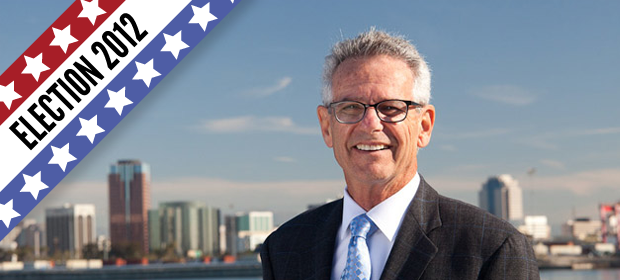
EDITOR’S NOTE: Who are the two men running for Congress in the newly redistricted 47th District? We wanted to know and thought you might too. So we sat down with both candidates and talked to them about everything except the hot-button issues (you can read info on that through our daily political news coverage). In part two of our two-part series on “Getting to Know Your CD-47 Candidates,” reporter Joseph Lapin spent some time with Alan Lowenthal to talk about the man behind the politics. To read Gary DeLong’s profile, click here.
Over the spitting spray of espresso machines, State Senator from the 27th District and democratic Congressional candidate, Alan Lowenthal, sat down at a wooden table at the Daily Grind coffeeshop to talk about his campaign. Lowenthal placed his foot on an empty chair, and he appeared calm and confident about the upcoming election.
“I’m just working about a half an hour a week,” Lowenthal joked. Lowenthal has lived in Long Beach since 1969 and he taught at Cal State Long Beach for 28 years as a community psychologist. He was also an activist, showing up to city council meetings and banging on doors at the Ports of Long Beach and Los Angeles to demand change to environmental policies. That was until 1992, when he won a seat at the Long Beach City Council, representing the 2nd District, and started to demand change from the inside.
“I see myself as a community activist,” Lowenthal said. “A person who clearly has a set of goals to change.” As a community psychologist and professor, Lowenthal worked with early parenting problems, mentorship programs in schools, and blue-collar families who lost their jobs due to a struggling economy. Lowenthal explains, “Community psychology tries to look at the person in relationship to their environment and prevent problems.”
He understands the complex nature of citizens losing their jobs. When the StarKist plant closed in the 80s, the city contacted Lowenthal to help alleviate the communal impact of such massive job loss. The employees, Lowenthal stated, had about a day’s to a week’s notice, and Lowenthal met with the Portuguese and Latino workers to help with their job searches and transition into new careers.
“It’s not just having a job,” Lowenthal said. “It’s having support around you; it’s having a sense of self-worth and self-esteem.”
Developing a positive community—and empowering it to prevent, not treat, many of the social, psychological and financial ills—is the condidate’s most recurring theme. A desire, a need influenced by his childhood. Lowenthal grew up in New York, and his father had several heart attacks, starting when Lowenthal was three-years old. His father’s medical condition became so intense that he could no longer work. So Lowenthal’s mother became the breadwinner in the family. Meantime, his father and uncle lost their clothing store and luncheonette, and his family was forced to move from Long Island to Queens — from a middle-class bracket to just barely hanging on.
“It provided me with a core of fear,” Lowenthal said on the impact of his childhood, “that things can get out of your control. People would call up and say, ‘We’re going to repossess your car. Is your mother home?’…I grew up with that core sense of fear, that you could lose everything.”
By selling vacuum cleaners, Lowenthal worked his way through college, and he persevered and received his PHD from Ohio State University. After receiving his PHD Lowenthal interned at Langley Porter, the neuropsychiatric institute at the University of California Berkley, which overlooked Haight-Ashbury and Golden Gate Park, during the height of the flower-power generation.
“The impact [Langley Porter] had upon me,” Lowenthal said, “was that the greatest changes you can make, even psychologically, are through political action. Improving the education system. Making sure there are adequate living conditions…Making sure there are jobtraining programs. Making sure there are youth shelters.”
Lowenthal is a man that prides himself on activism and connection to his community. For years he has been knocking on doors in Long Beach, and he wants to continue — except now he’s aiming for the doors in Washington.
“I think the people in Long Beach know me,” Lowenthal said. What they see is what they get. I try to do the best I can.”

